
Marion Eleanor Zimmer Bradley was an American author of fantasy, historical fantasy, science fiction, and science fantasy novels and is best known for the Arthurian fiction novel The Mists of Avalon and the Darkover series. She was noted for the feminist perspective in her writing.

Margaret St. Clair was an American fantasy and science fiction writer, who also wrote under the pseudonyms Idris Seabright and Wilton Hazzard.

Lesbian pulp fiction is a genre of lesbian literature that refers to any mid-20th century paperback novel or pulp magazine with overtly lesbian themes and content. Lesbian pulp fiction was published in the 1950s and 1960s by many of the same paperback publishing houses as other genres of fiction, including westerns, romances, and detective fiction. Because very little other literature was available for and about lesbians at this time, quite often these books were the only reference the public had for modeling what lesbians were. English professor Stephanie Foote commented on the importance of lesbian pulp novels to the lesbian identity prior to the rise of organized feminism: "Pulps have been understood as signs of a secret history of readers, and they have been valued because they have been read. The more they are read, the more they are valued, and the more they are read, the closer the relationship between the very act of circulation and reading and the construction of a lesbian community becomes…. Characters use the reading of novels as a way to understand that they are not alone." Joan Nestle refers to lesbian pulp fiction as “survival literature.” Lesbian pulp fiction provided representation for lesbian identities, brought a surge of awareness to lesbians, and created space for lesbian organizing leading up to Stonewall.
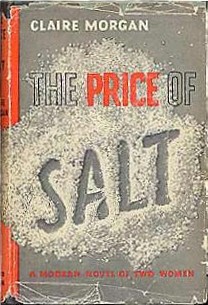
The Price of Salt is a 1952 romance novel by Patricia Highsmith, first published under the pseudonym "Claire Morgan." Highsmith—known as a suspense writer based on her psychological thriller Strangers on a Train—used an alias as she did not want to be tagged as "a lesbian-book writer", and she also used her own life references for characters and occurrences in the story.

Ann Weldy, better known by her pen name Ann Bannon, is an American author who, from 1957 to 1962, wrote six lesbian pulp fiction novels known as The Beebo Brinker Chronicles. The books' enduring popularity and impact on lesbian identity has earned her the title "Queen of Lesbian Pulp Fiction". Bannon was a young housewife trying to address her own issues of sexuality when she was inspired to write her first novel. Her subsequent books featured four characters who reappeared throughout the series, including her eponymous heroine, Beebo Brinker, who came to embody the archetype of a butch lesbian. The majority of her characters mirrored people she knew, but their stories reflected a life she did not feel she was able to live. Despite her traditional upbringing and role in married life, her novels defied conventions for romance stories and depictions of lesbians by addressing complex homosexual relationships.
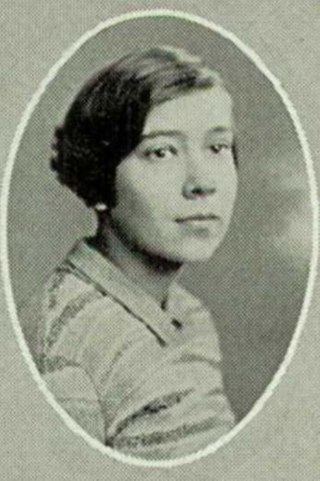
Valerie Taylor was an American author of books published in the lesbian pulp fiction genre, as well as poetry and novels after the "golden age" of lesbian pulp fiction. She also published as Nacella Young, Francine Davenport, and Velma Tate. Her publishers included Naiad Press, Banned Books, Universal, Gold Medal Books, Womanpress, Ace and Midwood-Tower.
Lancer Books was a publisher of paperback books founded by Irwin Stein and Walter Zacharius that operated from 1961 through 1973. While it published stories of a number of genres, it was noted most for its science fiction and fantasy, particularly its series of Robert E. Howard's Conan the Barbarian tales, the first publication of many in paperback format. It published the controversial novel Candy by Terry Southern and Mason Hoffenberg, and Ted Mark's ribald series The Man from O.R.G.Y. Lancer paperbacks had a distinctive appearance, many bearing mauve or green page edging.

Marijane Agnes Meaker was an American writer who, along with Tereska Torres, was credited with launching the lesbian pulp fiction genre, the only accessible novels on that theme in the 1950s.

Lesbian literature is a subgenre of literature addressing lesbian themes. It includes poetry, plays, fiction addressing lesbian characters, and non-fiction about lesbian-interest topics. A similar term is sapphic literature, encompassing works that feature love between women that are not necessarily lesbian.
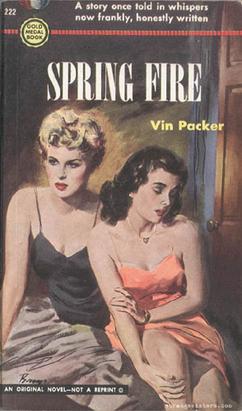
Spring Fire, is a 1952 paperback novel written by Marijane Meaker, under the pseudonym "Vin Packer". It is the first lesbian paperback novel, and the beginning of the lesbian pulp fiction genre; it also addresses issues of conformity in 1950s American society. The novel tells the story of Susan "Mitch" Mitchell, an awkward, lonely freshman at a Midwestern college who falls in love with Leda, her popular but troubled sorority sister. Published by Gold Medal Books, Spring Fire sold 1.5 million copies through at least three printings.

I Am a Woman is a lesbian pulp fiction novel written in 1959 by Ann Bannon. It is the second in a series of pulp fiction novels that eventually came to be known as The Beebo Brinker Chronicles. It was originally published in 1959 by Gold Medal Books, again in 1983 by Naiad Press, and again in 2002 by Cleis Press.
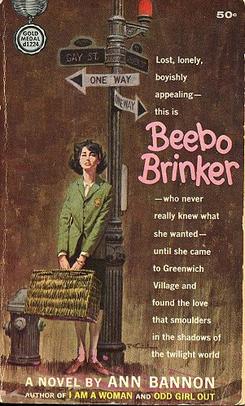
Beebo Brinker is a lesbian pulp fiction novel written in 1962 by Ann Bannon. It is the last in a series of pulp fiction novels that eventually came to be known as The Beebo Brinker Chronicles. It was originally published in 1962 by Gold Medal Books, again in 1983 by Naiad Press, and again in 2001 by Cleis Press. Each edition was adorned with a different cover. Although this is the last in the series, it is set first — a prequel to the others. In the order of the series, it follows Journey to a Woman. However, in the order of the events and characters in the series, Beebo Brinker takes place several years before Odd Girl Out does.

Tereska Torrès was a French writer known for the 1950 book Women's Barracks, the first "original paperback bestseller." In 2008 historians credited the republished book as the first pulp fiction book published in America to candidly address lesbian relationships, although Torrès did not agree with this analysis.
Peggy Gaddis Dern was an American writer of traditional romance novels, so-called "nurse novels," as well as racy pulp romance stories. Utilizing her actual surname as well as various pseudonyms, she was actively writing from the late 1930s up until the 1960s, ultimately producing dozens of books, perhaps even a couple hundred or more. Her primary literary identity was as Peggy Gaddis.

Louise Varèse, also credited as Louise Norton or Louise Norton-Varèse, was an American writer, editor, and translator of French literature who was involved with New York Dadaism.
Elaine Williams was an American lesbian pulp fiction author and editor of the late 1950s and early 1960s. She wrote under a pseudonym, largely either as Sloan Britton or Sloane Britain.
Yvonne Christine MacManus was an American novelist specializing in lesbian fiction and science fiction. Although she used her real name when writing in other genres, MacManus published lesbian fiction under the pseudonym Paula Christian.
Julie Ellis was an early lesbian pulp fiction author of the 1960s, writing pro-lesbian romance and erotica under varied pseudonyms for Midwood-Tower Publications. She changed her writing pseudonyms and legal name usage numerous times and later in life she wrote historical and romance fiction under the name Julie Ellis.
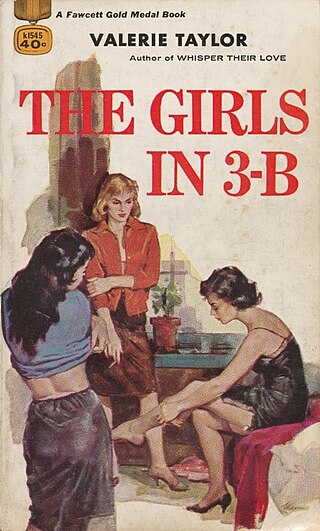
The Girls in 3-B is a classic work of lesbian pulp fiction by Valerie Taylor which was published in 1959 by Fawcett. Its happy ending for a lesbian character was unusual for the time period. It was one of the first three novels of any pulp fiction genre to be reprinted in 2003 by Feminist Press.

Women's Barracks: The Frank Autobiography of a French Girl Soldier is a classic work of lesbian pulp fiction by French writer Tereska Torrès published in 1950. Historians credit it as the first US paperback-original bestseller, as the first lesbian pulp fiction book published in America, and as "the pioneer of lesbian fiction". As the first of its genre, it received heavy backlash, and it was banned in Canada. Its popularity prompted the formation of the House Select Committee on Current Pornographic Materials in the United States. Its original cover art is considered a classic image of lesbian fiction.














